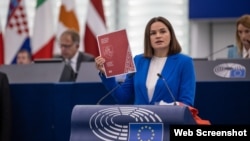In recent weeks, ads promoting online questionnaires and applications for obtaining Belarusian passports allegedly issued by the Belarusian opposition’s government-in-exile have been popping up on Belarusian social media and YouTube channels.
The forms, written in Belarusian, target the estimated 2 million Belarusians living outside their homeland. Those include hundreds of thousands of people that fled Lukashenko’s regime. He has been the country’s president for 30 years.
Last September, Lukashenko ordered Belarusian diplomatic missions to stop issuing passports to citizens living abroad.
The online passport forms ask applicants to provide detailed personal data, including their full name, date of birth, current address, country of residence, complete data from foreign government-issued ID and detailed information about family members.
The forms feature a close facsimile of the insignia of the transitional government formed in 2022 by Belarusian opposition leader Sviatlana Tsikhanouskaya. Dubbed the United Transitional Cabinet (UTC) of Belarus, this executive body includes representatives of Belarus’ democratic movement, business sector and security apparatus.
Last August, the transitional government announced it would issue citizenship passports to Belarusians living in foreign countries.
In December, UTC foreign affairs representative Valery Kovalevsky told European Radio for Belarus, a Warsaw-based station, that his government planned to begin issuing its first passports in March 2024.
However, the recently advertised forms are fake and believed to be part of a data collection operation by Lukashenko’s intelligence services.
“Websites, social media pages, and even advertisements allegedly on behalf of the United Transitional Cabinet of Belarus continue to appear on the Internet to collect data on citizens of Belarus living abroad,” the UTC’s foreign affairs office said in a February 1 Telegram post.
“We declare that at the moment, the United Transitional Cabinet of Belarus, the Representation on Foreign Affairs, and the Office of Sviatlana Tsikhanouskaya are NOT compiling any lists for obtaining a new national passport!”
“Any such ‘gathering’ should be considered a provocation by the regime's special services to gather information about Belarusians outside the country...”
It added that the UTC is still in the process of creating a body responsible for collecting, processing and storing Belarusians' personal data.
Later on February 1, Tsikhanouskaya posted a similar warning on her Telegram channel.
Mediazona, an exiled Russian news site based in Europe, reported that the fake Belarusian passport application forms have also been advertised on YouTube. The advertisement mimicked elements of the official UTC insignia.
Multiple news outlets have also reported that the “mass advertisements” for the passport forms are likely part of a Belarusian regime operation to collect the personal information of Belarusians living abroad.
On February 6, Belarusian Ambassador to Russia Dmitry Krutoy told reporters in Moscow that Belarus and Russia are creating a joint database of extremist individuals and materials.
The United States and the European Union have deemed Lukashenko’s rule illegitimate, stating that Belarus’ August 2020 presidential elections were rigged. In and around the elections, government forces violently dispersed opposition protesters and carried out mass arrests.
Russia and China have recognized Lukashenko’s presidency as legitimate.
Lithuania, a Baltic state that gave asylum to the Belarusian opposition leadership, has recognized Tsikhanouskaya as Belarus’ legitimate president.





